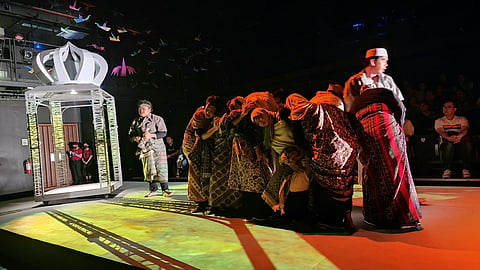

A year after it premiered, Anak Datu is returning to the stage, opening the 37th season of Tanghalang Pilipino, the resident theater company of the Cultural Center of the Philippines.
When it debuted, it immediately became a landmark production in several ways. It was one of the first plays to be mounted with a live audience after the lockdowns and restrictions of the coronavirus pandemic in 2020 and 2021. And it was the first play to be staged at the newly opened CCP Black Box Theater or Tanghalang Ignacio Gimenez.
Anak Datu is one of the few plays on the Tausug and Moro people and cultures of Mindanao, portrayed with marked sensitivity and apparent diligence. It was lauded by critics and audiences, with former Vice President Maria Leonor "Leni" Robredo as one of the prominent people who trooped to CCP to watch the play on 1 October 2022.
The play went on to win six awards at the 13th Gawad Buhay and five at the 35th Aliw Awards.

Fine-tuned production
Despite the accolades and being one of the most important theatrical events in 2022, the play was faulted by some for what was seen as its confusing storytelling, its shifts in timeline and milieus, and the cumbersome sets.
The second staging afforded the creative team the opportunity to fine-tune these and other aspects of the production. According to director Chris Millado, former CCP vice president and artistic director, they were able to make the storytelling clearer and supply an elevated platform to make the designs of the light projections more visible.
For Dennis N. Marasigan, current CCP vice president and artistic director, "[o]n its rerun, Tanghalang Pilipino's Anak Datu is tighter, its storytelling and technical aspects clearer and crisper, and its staging even more affecting, effectively overlaying story, myth and history."
The restaging marks another milestone in the journey of the play, which started in 2018 from talks that artist Toym Imao, son of the late National Artist for visual arts Abdulmari Asia Imao, had with Millado and veteran actor and TP artistic director Fernando "Nanding" Josef about making a stage adaptation of the elder Imao's short story for children, written in 1968, the year Toym was born.
The team recruited award-winning playwright Rody Vera to write the script. The plan became more concrete when Josef decided to make the project TP's first original play after the pandemic lockdowns. By then, the play has evolved into something larger than the original story.
Serving as Anak Datu's set designer, Imao recalled the anxieties they felt during the first stages of production, especially the prospect of one of them getting sick and shutting down the show.
"But we were able to tell an essential story that was important, especially for a nation that was coming out of the devastating election of May 2022 for a lot of people. It is something important for us na nakapagkuwento kami (we were able to tell a story)," he said.

Three stories
Anak Datu tells three stories — Toym's childhood with his father (Paul Jake Paule) and mother, Grace de Leon (Toni Go-Yadao); his father's short story; and the recent history of his father's people, the Muslim Tausug in Sulu Archipelago and the Moro, the collective Muslim ethnic groups, of Mindanao.
The Imao family portion shows Toymie (Carlos Dala) growing up with Voltes V and other preoccupations of middle-class children in Metro Manila.
Then there is the story of the disputed 1968 Jabidah Massacre, told through Jibin Arula (Gie Onida), the lone survivor — how young Tausug men, mostly illiterate, were recruited by the military, transferred to Corregidor and then massacred upon the discovery of a suspicious plot.
Also dramatized is the 1974 Palimbang Massacre, in which the military allegedly murdered more a thousand Moro men inside the Malisbong masjid in the province of Sultan Kudarat, while 3,000 women and children were detained and about 300 homes were burned down.
These incidents were said to have sparked the conflicts and armed struggle in Mindanao that would scar the region for decades.
Along with the contemporary scenes is the retelling of the short story Anak Datu, set in a pre-colonial time and rendered in mythical mode, combining both the familial and the tragic. The Tausug village of datu Karim (Hassanain Magarang) and his wife Putli Loling (Tex Ordoñez-De Leon and Lhorvie Nuevo) is attacked by pirates, led by Jikiran (Ramli Abdurahim), who kidnaps the pregnant Putli Loling. She gives birth to Karim, who grows up knowing Jikiran as his father but later learns the truth.

Graceful movements
All throughout, the play shifts among these threads of stories, each one compelling and multi-layered. Counterbalancing the oral storytelling is the dramatization through graceful movements,
choregraphed by Magarang using the pangalay or Tausug traditional dance, a shared art form with the Yakan (pamansak) and Sama (igal) peoples, thus rendering the stories more visual and adding allure and distinctive cultural flavor to the play. The dances are accompanied by a live kulintangan or gong ensemble.
The stark interiors of the theater come alive and burst with colors courtesy of the lighting by Katsch Catoy and projection design of GA Fallarme, who uses Abdulmari Imao's paintings and traditional Tausug and Meranaw motifs such as the okir as inspirations.
Toym's set pieces are highly movable to keep up with the constant shifts in storytelling, and the bigger ones are like art installations, contributing to the visual richness of the production.
Harnessing memory, myth and history, Anak Datu is able to weave its stories into an enthralling whole, establishing interconnectedness and consolidating the story of a person, a family and a community into the very story of a nation, like three or more streams converging into a great river.
Tanghalang Pilipino's Anak Datu runs 29 September to 15 October at Tanghalang Ignacio Gimenez (CCP Black Box Theater).
